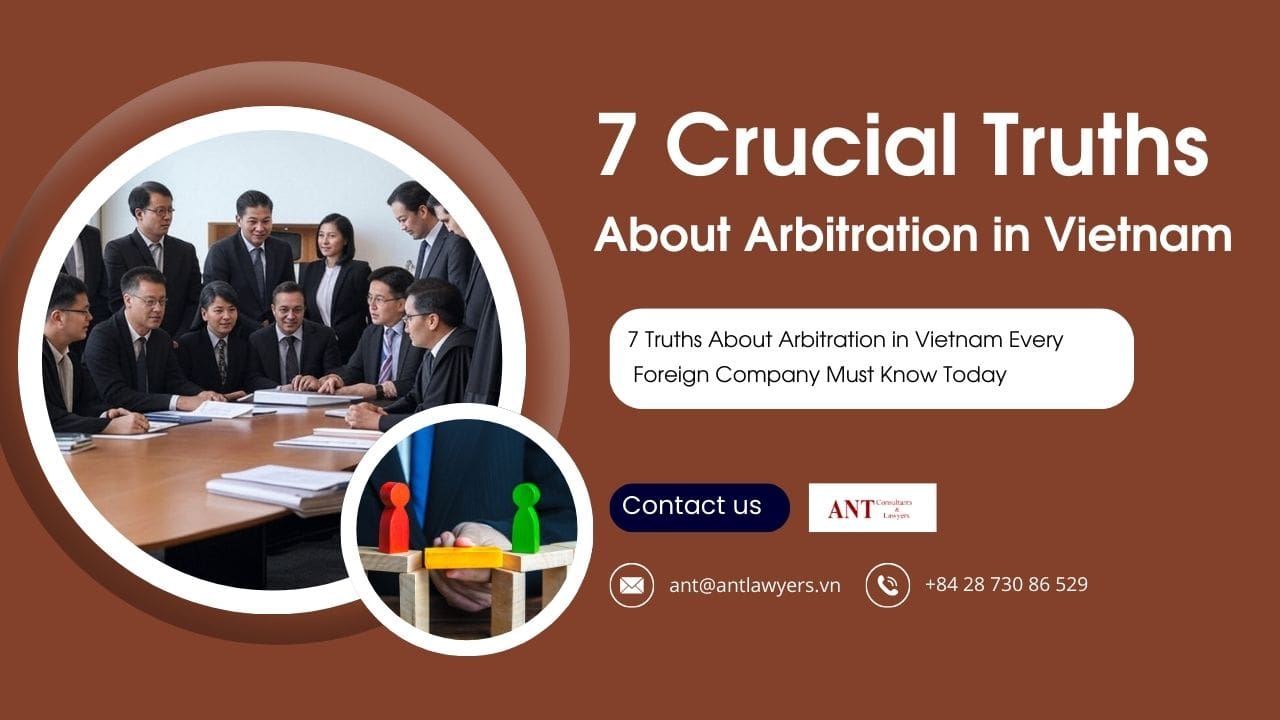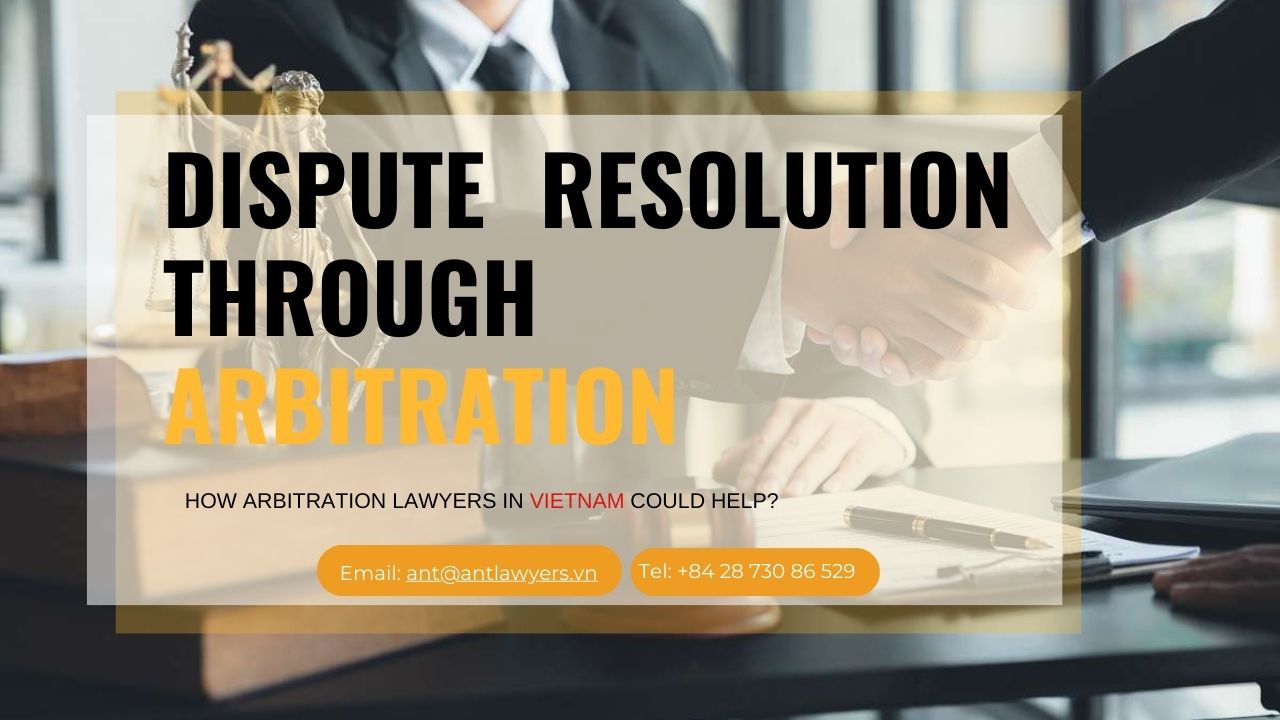What 7 Crucial Truths About Arbitration in Vietnam Every Foreign Company Must Know Today?


Arbitration in Vietnam
Let’s face the fact, as business owners or directors, would you normally look at dispute resolution clauses. Or most of the time, you only focus on the price offered to the clients and imagine about how much profit the company would make if such contract is delivered and how to achieve the target given by the superiors. In realities, there is a chance, the contract runs into a dispute, and arbitration in Vietnam is dispute resolution mechanism.
There are business owners and directors whom know about arbitration in their home countries. But each country might have its own characteristics to run about arbitration.
There are countries which follow UNCITRAL Model Law, there are countries which adopt many principles of the UNCITRAL Model Law, and there are countries which do not follow UNCITRAL Model Law.
On that aspect, arbitration in Vietnam could be different from arbitration in other countries.
Arbitration in Vietnam can feel like a maze with hidden traps, especially if you’re a foreign company caught in a commercial dispute without a clear path forward.
If you’re doing business in Vietnam and find yourself facing a disagreement, whether over contract terms, delivery timelines, or payment obligations, and if you’re unprepared, it could become an expensive, time-consuming nightmare.
In here, we explain how arbitration in Vietnam works. We also explain the risks, your options, and the strategic moves you must make now to avoid serious loss.
Understanding Arbitration in Vietnam: Not Just Another Legal Process
Arbitration in Vietnam is a private, legally recognized method of resolving disputes without going through the court system. It’s not simply a faster trial, it’s a contract based process that must follow agreed upon rules and procedures.
Under Vietnamese law, arbitration is governed by its own legal framework, which is the law on commercial arbitration and it’s especially relevant when:
- A commercial contract contains an arbitration clause
- The parties prefer confidentiality
- Enforcing the outcome across borders is important
For foreign companies, understanding arbitration in Vietnam means knowing:
- The process is binding and final
- The law honors arbitration clauses
- Time and procedure are everything
- Silence or delay can lead to default
Is it right Arbitration in Vietnam starts to be accepted, but many foreign investors misunderstand or underestimate its formality. This is where trouble begins.
The Legal Framework: What Powers Arbitration in Vietnam?
Arbitration in Vietnam is regulated in Vietnamese law.
The main legal basis includes:
- The Law on Commercial Arbitration
- The Civil Procedure Code (for enforcement)
- International conventions Vietnam has ratified (notably the New York Convention on the enforcement of foreign arbitral awards)
These laws give arbitration real power. An arbitral award has the same enforceability as a court judgment, provided the process followed the rules.
Key features of arbitration under Vietnamese law:
- Parties must have a written arbitration agreement (e.g., in a contract)
- Proceedings are confidential
- Arbitrators can be Vietnamese or foreign, depending on the agreement
- Awards are final and binding
- Courts can support and enforce arbitration, but cannot interfere with its merits
What this means for foreign companies: You must take your arbitration clause seriously. Once a dispute starts, you’re already on the clock.
Common Triggers for Arbitration in Vietnam
Many foreign companies don’t even realize they’re in arbitration territory, until it’s too late.
Common disputes that lead to arbitration in Vietnam include:
- Contractual breach (delivery, quality, payment)
- Joint venture breakdowns
- Construction delays or cost overruns
- Shareholder or partnership disputes
- IP or technology licensing violations
Often, these disputes do not start with too much warnings. Instead, one party stops replying. Deadlines pass. A dispute notice is issued. Suddenly, the case is in arbitration, and the foreign company is still “waiting for a reply” that never comes.
That is how companies forfeit their procedural rights before they even realize there is a case.
How the Arbitration Process in Vietnam Works
Foreign businesses are often surprised by how structured arbitration in Vietnam is.
Here’s a quick view of the process:
Step 1: Arbitration Notice
One party submits a written notice of arbitration, outlining the claims, the contract, and the chosen rules.
Step 2: Response and Counterclaims
The other party typically has 30 days to respond (depending on the agreed rules). Failure to respond can result in default proceedings.
Step 3: Appointment of Arbitrator(s)
Each party may appoint one arbitrator, and a third may be jointly appointed if required.
Step 4: Preliminary Conference
Arbitrators and parties agree on procedure, schedule, document exchange, and hearing dates.
Step 5: Evidence and Hearings
Both sides submit written arguments, documentary evidence, and possibly expert reports. Hearings may be held in person or online.
Step 6: Final Award
The arbitral tribunal issues a decision that is final and binding.
The process follows strict timelines. Ignoring notices or failing to hire arbitration experienced legal counsel can worsen your defense.
Enforcement of Arbitral Awards
1. Enforcing an award in Vietnam
If the award is rendered in Vietnam, you can apply to the local court to enforce it. The court may review the award for procedural issues but cannot overturn it just because a party dislikes the outcome.
2. Enforcing a foreign award in Vietnam
As Vietnam is a member of the New York Convention, foreign arbitral awards can be recognized and enforced, but:
- The award must not conflict with principles of Vietnam law
- Translation and certification must be in order
- The defendant must be properly notified during arbitration
Enforcement can take several months. Local counsel is essential to navigate court procedures and avoid delays.
Winning the award is just part of the battle. Proper enforcement planning is critical.
Drafting Smart Arbitration Clauses in Vietnam-Related Contracts
Many arbitration disasters stem from poorly drafted clauses.
When working with Vietnamese partners, foreign companies should ensure:
- The arbitration clause clearly states the seat (location) of arbitration
- It specifies the number of arbitrators
- The rules (institutional or ad hoc) are referenced clearly
- The language of arbitration is agreed
- Enforcement is considered based on assets and applicable laws
The best time to prepare for a dispute is before it happens. A well drafted arbitration clause can save a lot of cost and time.
5 Mistakes Foreign Companies Make in Vietnamese Arbitration (and How to Avoid Them)
1. Ignoring Early Red Flags
Not responding to demand letters, notices of arbitration, or procedural emails can lead to loss of rights or a default award.
2. Hiring the Wrong Lawyer
A general business lawyer may not understand the specific rules, deadlines, and tactics of arbitration. You need arbitration counsel, preferably with cross-border experience.
3. Relying on Informal Communication
Sending an email to “explain your side” is not a valid response. Arbitration requires formal submissions under strict rules.
4. Underestimating Translation and Language Issues
Submissions and evidence must often be translated. Mistranslations can cost you the case.
5. Failing to Think About Enforcement
Before you even file a claim, consider: Where are the assets? Will you be able to enforce a win?
Arbitration in Vietnam rewards the well-prepared, and punishes those who think it’s just a formality.
Arbitration in Vietnam Is a Powerful Tool
Foreign companies entering Vietnam often focus on growth, partnerships, and opportunity. But contracts, disputes, and enforcement are part of the landscape too.
Arbitration in Vietnam offers a confidential, enforceable, and relatively efficient method of dispute resolution, but only when companies:
- Understand the rules
- Respond promptly
- Draft their contracts carefully
- Work with the right advisors
The stakes are high. But with knowledge, preparation, and strategy, arbitration in Vietnam can work in your favor, even across borders and legal systems.
About ANT Lawyers, a Law Firm in Vietnam
We help clients overcome cultural barriers and achieve their strategic and financial outcomes, while ensuring the best interest rate protection, risk mitigation and regulatory compliance. ANT lawyers has lawyers in Ho Chi Minh city, Hanoi, and Danang, and will help customers in doing business in Vietnam.
How ANT Lawyers Could Help Your Business?
You could learn more about ANT Dispute resolution practices or contact our Dispute Lawyers in Vietnam, supported by field experts via email ant@antlawyers.vn or call our office at (+84) 24 730 86 529
Recent Posts
7 Essential Truths to Open an Indirect Investment Account in Vietnam and Grow with Confidence
Do you want to invest overseas into Vietnam? Do you want to open an indirect…
5 Crucial Facts About ESG Laws in Vietnam That Could Save Your Business and Reputation
The Business World Is Changing Fast Rules are shifting. Expectations are rising. Eyes are watching. …
7 Powerful Reasons Why ESG Compliance in Vietnam Will Win You Trust, Growth, and Global Clients
Trust matters. Today, more than ever. Across industries, many companies are now being asked. directly…
7 Bold Reasons Why Tokenization in Vietnam Could Transform Your Future
Change is coming. Quietly. Digitally. Rapidly. Let’s imagine the situation, which assets are no longer…
Vietnam P2P Lending: 5 Bold Reasons Why Decree 94/2025 Could Empower Millions or Backfire?
A New Financial Chapter Begins in Vietnam One person lends. Another borrows. It’s that simple.…
5 Essential Lessons from Risk Management in Digital Assets in Vietnam: Protecting Trust in a Digital World
Trust Is the Real Currency Money can be lost. Tokens can vanish. Platforms can crash.…



